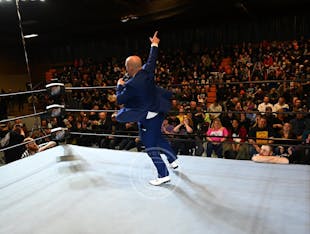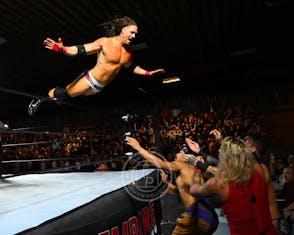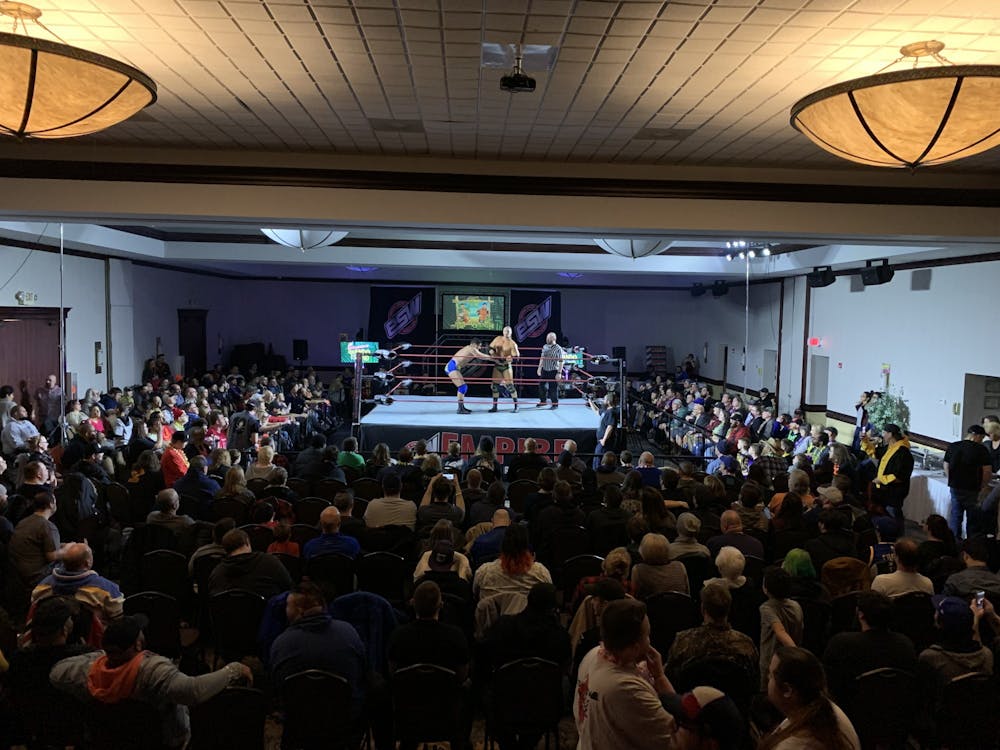After a year of the pandemic, live entertainment feels like an artifact of the pre-COVID-19 world.
Sporting events are no exception.
But in February, New York slowly began to return to normal when it allowed fans to enter stadiums and arenas — at 10% capacity — granted they present a negative PCR COVID-19 test result within 72 hours of the event.
This finally allowed teams and venues the opportunity to once again serve concessions and collect revenue at the gate, providing a slight boost to their financial situations in one of the darkest economic periods in sports history. And this doesn’t just have the potential to benefit the four major sports leagues; the Buffalo professional wrestling community desperately needs the boost, too.
At a time when major sports teams across New York State are hosting fans, independent professional wrestling promotions in the Empire State are still struggling to host events, let alone have fans.
Buffalo-based independent wrestling promotion Empire State Wrestling (ESW) hasn’t held any events since the pandemic began, and everyone from wrestlers to fans to members of the press are feeling the effects.

“I haven’t been in a ring in almost a year now, in any form,” Brandon Thurston, an independent wrestler and podcast host on Wrestlenomics.com, said. “There’s a handful of events here and there [run by other independent promotions] that are mainly produced to be a video product, although you do see some fans in the audience. When I see things online, it’s sort of a spaced-out, handful of fans where they’re all wearing masks. There’s just been very few events.”
Before the pandemic, ESW carved out a niche audience in Western New York, holding events in communities like North Tonawanda and Lockport with shows hosting up to 1,000 fans per night.
Independent wrestlers in WNY have been particularly hampered by the transition from performing in front of hundreds of fans every month to not performing at all.
“We go from running shows once a month, once every other month to being without it for over a year now,” wrestler Vince Valor said. “It’s tough for wrestlers because that’s what they’re so used to, but it’s also tough for an audience because they miss it just as much as we do.”
The biggest obstacle with running a wrestling event in New York comes in the form of the New York State Athletic Commission.
Since most states consider professional wrestling a performance, not a sport, independent promotions can simply rent a venue and run a show. However, the NYS Athletic Commission plays by a different set of rules.
Instead of treating professional wrestling as a performance, New York considers pro wrestling to be a “combative sport,” like boxing and mixed martial arts. This means the promotion must carry “combative insurance,” a type of medical insurance that protects athletes. The prices of such insurance can exceed $600 per show. Promoters must pay to have a doctor and ambulance on sight, costs that would usually be covered by ticket revenue. However, because of the pandemic, there is no ticket revenue.
“We’re over $1,000 in the hole just to run a show,” ESW executive producer Johnathan Ashe said. “Unfortunately in New York State, you need to bring in 150 to 200 fans at the minimum to break even. Even if we tried to go the way of filming matches with no crowd we’d still have to spend thousands of dollars to do that with no upside of it.”
Thurston says that even if ESW is allowed to operate at a 25% capacity, making revenue is quite difficult.
While ESW generates some money from sponsorships and monetizing YouTube and Independentwrestling.tv content, the promotion mainly generates revenue through ticket sales at live events.
“[I’m not sure anybody would] want to run a venue at 25% capacity or something like that because the possibility of making any money that way will be basically impossible,” Thurston said. “I think it needs to be at the point where we can have people at full capacity again and I don’t think that’s going to be until sometime in the second half of the year at the earliest.”
With live shows out of the picture, ESW has resorted to digging through its archives and posting unreleased matches online.
“Ninety nine percent of our business has been decimated over the last year,” Ashe said. “We’ve been running consistently for the last 11 years, so we have a huge archive that’s really not out there. So within the last year, I’ve been making an effort to edit all of the older shows and stick those up on YouTube and Facebook so at least we’re still trying to keep our fans entertained as best as possible.”
Money can be tight at times in the independent wrestling business, and the pandemic is only making it worse.
But even though funding can be a regular struggle for ESW and other independent promotions, the dedication of fans is the true payoff for many performers.
“People have a deep passion for independent wrestling, but the business opportunity is not proportionate to the passion that people have for it,” Thurston said.

After the pandemic, ESW and other independent wrestling promotions will be relying on fan support to make a successful comeback.
Since independent wrestlers are essentially independent contractors, they can wrestle for different promotions across the state — and even the country.
This includes ring announcers, too, which is potentially advantageous as other states have been quicker to open their doors to spectators.
Chris Gullo, an ESW ring announcer, says he wishes he explored working for promotions in other states instead of working strictly in New York before the pandemic.
“I went from being booked almost every single weekend to absolutely nothing,” Gullo said. “There’s only one ring announcer every show. It’s very hard for me to even try to get into these other federations in other states because they already have people.”
The pandemic’s impact on independent wrestling has forced Gullo to reevaluate his professional decision-making. His self-proclaimed “snobbiness and elitism” is gone. Before, he wouldn’t even consider working for certain independent promotions. Now he’s hoping for any work at all.
“It’s almost like you don’t know what you have until it’s gone,” Gullo said. “Now I’m just hoping to get on any show. I used to be like, I’ll only work for certain types of promotions and this and that, now I’m lowering my expectations in the aspect of [thinking], ‘maybe I would work for this promotion where I wouldn’t have before the pandemic,’ so it’s broadened my horizons.”
Gullo isn’t the only one searching for work. As a wrestler, Vince Mease has only had two matches since the pandemic began.
He was able to work a small show in Rochester and then drove four hours to Altoona, PA to get a gig. He says one of his newest struggles is filling his newfound free time.
“I haven’t lived that normal lifestyle of like, I have a weekend free, [so] what can I do? [But] it’s been a lot of that recently,” Mease, who goes by Invincible Vince Valor in the ring, said. “But it’s a matter of also keeping in shape because you don’t know when this is finally gonna be over. So when that first match does hit you’re gonna find out who’s in shape and who’s not and who used their time wisely.”
Wrestlers are trying to stay in shape, but ring announcers, referees and producers are also trying to find ways to pass the time.
In the absence of ESW, Gullo and Ashe started a podcast called “Rediscovering the Indies,” where they break down the history of independent wrestling.
The pair recorded their first episode in late August as a way to kill some time during quarantine, but the podcast has gained popularity rather quickly.
At one point, “Rediscovering the Indies” even charted on Apple Podcasts’ Germany charts. Despite an oversaturation of wrestling blogs and podcasts, Gullo and Ashe have found themselves a niche category and a growing audience.
“One thing we noticed there really weren’t any podcasts out there highlighting the history of indie wrestling,” Ashe said. “A lot about WWE (World Wrestling Entertainment), WCW (World Championship Wrestling), ECW (Extreme Championship Wrestling), but nothing really about indie wrestling. A podcast came out of us just having four, five or six-hour drives together in a car just shooting the s— about stuff.”
“We’ll either take a promotion, a promoter, a talent or an event and just kind of go in-depth with it,” Gullo said. “We do research, go through newspaper articles and we’ll read like the [Wrestling] Observer from [Dave] Meltzer. We’ll take that all and do this big timeline piece.”

Even though wrestlers and other wrestling talent are doing their best to keep themselves busy, they all envision a world where independent wrestling in New York returns to packed houses.
Valor describes the “crazy” ESW crowds as one of his favorite audiences to perform for, and is already visualizing what it will be like to walk through an ESW curtain for the first time in over a year.
“As a wrestler, it’s big to have that first match back, it’s going to be a huge moment, you feel at home,” Valor said. “I can’t wait to step through that curtain and hear the audience and hear their reaction because they miss this just as much as we do.”
With the explosion of wrestling blogs, websites and podcasts, independent wrestling has never been more popular. Still, wrestlers urge fans to support ESW whenever the promotion is able to return to the stage. In an industry that doesn’t generate as much revenue as the fans’ loyalty indicates, wrestlers and promoters need spectators to return in order to run a successful show.
“I would hope that when things do come back they support it the same way they did before,” Valor said. “I’ve tried to use wrestling as escape with anything that is going on in the world. This is your escape, this is your chance to really let loose and believe in something that’s bigger than you. I would hope that they see that for what it is and support it the same way they always have.”
Independent wrestling isn’t the same spectacle as the WWE; rather, it’s a completely different product.
After the pandemic, ESW and other independent wrestling promotions will be relying on fan support to make a successful comeback.
“If you’ve watched wrestling on TV this is not it. We’re not a big motion picture or Broadway. We’re more of your local bar that brings in a band on a Friday night,” Ashe said. “Everyone’s going along with the music, everyone’s getting into it, drinking and having a good time. That’s pretty much what indie wrestling is. And if you’ve never gone to an indie show, all I can say is give it a try, you won’t be disappointed.”
Anthony DeCicco is the senior sports editor and can be reached at anthony.decicco@ubspectrum.com

Anthony DeCicco is the Editor-in-Chief of The Spectrum. His words have appeared in outlets such as SLAM Magazine andSyracuse.com. In 2020, he was awarded First Prize for Sports Column Writing at the Society of Professional Journalists' Region 1 Mark of Excellence Awards. In his free time, he can be found watching ‘90s Knicks games and reading NFL Mock Drafts at 3 a.m.





